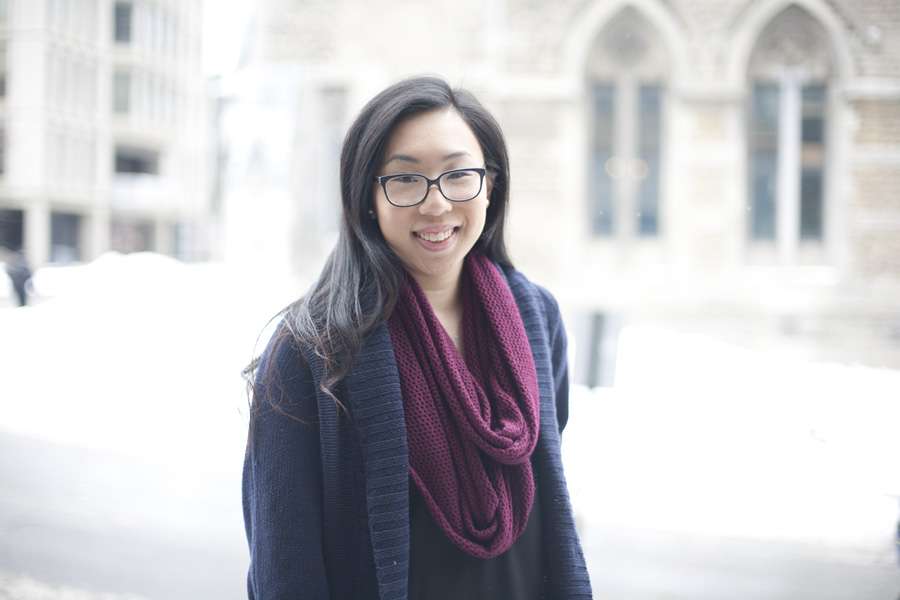The last documentary Karen Chow watched was on Soong May-ling, “China’s eternal first lady,” the wife of mid-early twentieth century Chinese political and military leader Chiang Kai-shek.
“At the time it was rare for women to be that powerful or that confident,” Chow explained. “She had a lot of influence on politics in China. It was really inspiring.”
As a leader of her own kind on campus, Chow effortlessly balances her schoolwork and extracurricular engagements as the Chair of the National Integrative Research Conference (NIRC) and co-president of the McGill Chinese Students’ Society (MCSS).
Chow has been involved with NIRC since 2011, when her role was to seek sponsorship for the conference. Run by McGill’s Bachelor of Arts and Sciences Integrative Council (BASiC), the purpose of the conference is to provide a platform for undergraduate students from across Canada to showcase their research in interdisciplinary fields.
“It’s really interesting to see what other students are doing if they’re interested in research,” Chow said. “In my first year […] I got involved with the conference, just seeing what students are doing and what I might be interested in [….] I think it’s a really good forum for sharing ideas, especially for Arts and Science.”
As the NIRC committee’s Chair, she has assumed a larger role in this year’s upcoming conference, which will take place on March 28.
“This year we had over 30 to 40 applicants,” Chow said. “The research topics were really interesting. We’ve got areas from biotech and environment [to] cognitive science and psycholinguistics.”
As co-president of MCSS, Chow runs one of the oldest, and largest student societies in Canada, with 25 people on its executive alone.
MCSS hosts events throughout the year, including their dating game “Meet me Halfway,” and their upcoming semi-formal “#Hashtag.” The events were what first drew Chow to the society.
“I was really impressed with all the events that they hold,” she recalled. “They run really smoothly and the audience of the events, they’re all team players [….] It’s work, but it’s [also] play, and everyone’s like a family.”
Chow has been part of MCSS since her first year at McGill and attributes it as her most influential experience at university.
“I learn a lot of things about how I work, [and] about how I think, or about how I work with other people each year, [through] every project and event that I’m involved in,” she said.
One way that her involvement has shaped her is by helping her become more assertive.
“I’m not a really good public speaker and I’ve always been kind of scared of public speaking,” she said. “In MCSS when you have to get your point across to 25 people, you have to shout and be more assertive [….] This year, especially being co-president, I’ve learned to find that balance.”
Working with MCSS has also revealed Chow’s strengths. She said both MCSS and NIRC require her to establish trust and open communication with her peers.
“I always tell someone, ‘If you see something wrong or see something that could be improved, speak up,’” she said. “It goes back to why I like working in a team—I really like that back and forth, bouncing around ideas. It’s like a snow ball—that’s how good ideas develop and get implemented.”
Ultimately, Chow is proud of the work she has put into her involvement in the McGill community.
“It does take up a lot of your time,” she said. “Sometimes it might be a burden, but in the end, it’s worth it. It makes you happy when people come to your events and like your work and like your results.”
McGill Tribune: Which building on campus would you be?
Karen Chow: The Redpath Museum. It houses a lot of stories and histories.
MT: What’s your favourite food?
KC: Oh my gosh, I love food. I’m not a very picky eater. I really like bread and spinach dip. Like baguette and spinach dip; it’s really simple.
MT: If you could ask a question to anyone in history, what would it be?
KC: I would really like to know what [my grandparents] were thinking when they first came to Canada, and maybe ask them, “was it worth it?
MT: Where in the world would you visit?
KC: I’ve always wanted to go to Singapore. It’s very clean, I really admire that.
MT: What are your hobbies?
KC: I really like watching documentaries and reading biographies [….] [The authors are writing about things they’ve learned and the mistakes that they’ve overcome [….] Maybe, I can benefit from them, too.









